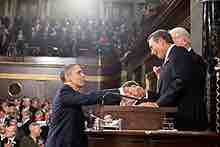A conference committee is a committee of Congress appointed by the House of Representatives and Senate to resolve disagreements on a particular bill. The conference committee is usually composed of the senior members of the standing committees of each house that originally considered the legislation.
Conference committees operate after the House and the Senate have passed different versions of a bill. Conference committees exist to draft a compromise bill that both houses can accept. Both houses of Congress must eventually pass the identical legislation for the bill to become law. The two houses can reach that identical product through the process of amendments between Houses, where the House passes the Senate bill with a House amendment, or vice versa. Thus most major bills become law through using a conference committee.
After one house passes a bill, the second house will often pass the same bill, with an amendment representing the second house's work product. The second house will then send a message to the first house, asking the first house to concur with the second house's amendment. If the first house does not like the second house's amendment, then the first house can disagree with the amendment of the second house, request a conference, appoint conferees, and send a message to that effect to the second house. The second house then insists on its amendment, agrees to a conference, and appoints conferees.
Each house determines the number of conferees from its house. The number of conferees need not be equal from each side. In order to conclude its business, a majority of both House and Senate delegations to the conference must indicate their approval by signing the conference report.
The authority to appoint conferees lies in the entire House, and the entire Senate can appoint conferees by adopting a debatable motion to do so. But leadership have increasingly exercised authority in the appointment of conferees. The House and Senate may instruct conferees, but these instructions are not binding on conferees.
Conference committees can be extremely contentious, particularly if the houses are controlled by different parties . House rules require that one conference meeting be open to the public, unless the house, in open session, votes that a meeting will be closed to the public. But apart from this one open meeting, conference committees usually meet in private and are dominated by the Chairs of the House and Senate Committees.

John Boehner
Speaker of the House John Boehner (R), seen here with President Barack Obama during the 2011 State of the Union, called for a conference committee to discuss new tax policies that were introduced to the house in 2011. Critics say he used the conference committees to stall the passing of any tax compromises.
House and Senate rules forbid Conferees from inserting into their report matter not committed to them by either house, but conference committees sometimes do introduce new matter. In such a case, the rules of each house provide that a Member may object through a point of order, although each house has procedures under which it can vote to waive the point of order. The house provides a procedure by which the offending provision may be stricken from the bill. Formerly, the Senate required a Senator to object to the whole bill as reported by the conference committee. If the objection was well founded, the Presiding Officer ruled and a Senator could appeal the ruling of the Chair. If the appeal was sustained by a majority of the Senate, it had precedential effect, eroding the rule on the scope of conference committees.
The conference committee produces a conference report melding the work of the House and Senate into a final version of the bill. A conference report proposes legislative language as an amendment to the bill and also includes a joint explanatory statement of the conference committee. This explanatory statement provides one of the best sources of legislative history on the bill.
Once a bill has been passed by a conference committee, it goes directly to the floor of both houses for a vote, and is not open to further amendment. In the first house to consider the conference, a Member may move to recommit the bill to the conference committee. But once the first house has passed the conference report, the conference committee is dissolved and the second house to act can no longer recommit the bill to conference.